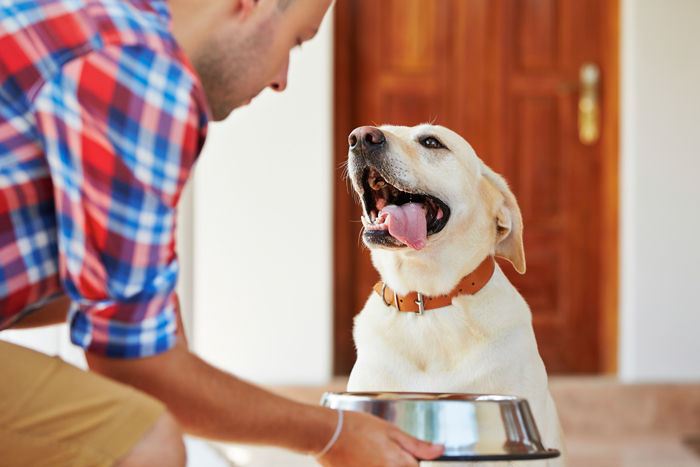Many canines are susceptible to this potentially life-threatening condition.
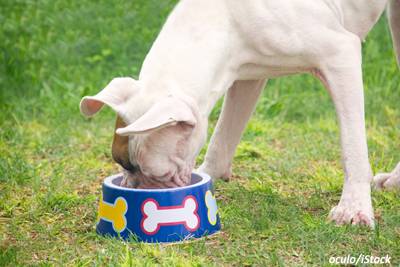 Most dogs are very enthusiastic about their food. In fact, one often wonders if they ever taste anything particularly those that vacuum up a meal in literally seconds. It’s a problem, because dogs who eat with such gusto can be candidates for developing a condition called bloat, which can be life threatening.
Most dogs are very enthusiastic about their food. In fact, one often wonders if they ever taste anything particularly those that vacuum up a meal in literally seconds. It’s a problem, because dogs who eat with such gusto can be candidates for developing a condition called bloat, which can be life threatening.
Bloat actually refers to two conditions, according to petMD.com. The first is gastric dilatation, in which the stomach distends with gas and fluid. The second is volvulus, in which the distended stomach rotates on its long axis. The spleen, which is attached to the wall of the stomach also rotates with the stomach.
When gas and fluid is trapped in the stomach, causing it to distend as the mixture ferments, blood circulation is cut off, which can result in a number of other medical issues, such as acute dehydration, bacterial septicemia, circulatory shock, cardiac arrhythmias, gastric perforation and even death.
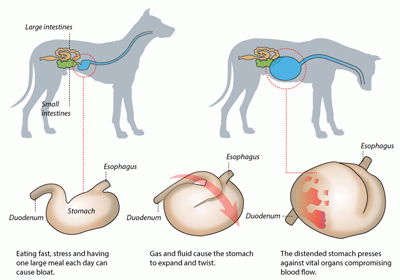 Bloat can occur in any dog at any age, but typically occurs in middle-aged and older dogs. Large-breed dogs with deep chests are anatomically predisposed, such as Great Danes, German shepherds, St. Bernards, Labrador Retrievers, Irish Wolfhounds, Boxers and Weimaraners, as well as medium-sized breeds, such as Shar-Peis and Basset Hounds. While this condition is not common in small breeds, it has been known to occasionally occur when they are elderly.
Bloat can occur in any dog at any age, but typically occurs in middle-aged and older dogs. Large-breed dogs with deep chests are anatomically predisposed, such as Great Danes, German shepherds, St. Bernards, Labrador Retrievers, Irish Wolfhounds, Boxers and Weimaraners, as well as medium-sized breeds, such as Shar-Peis and Basset Hounds. While this condition is not common in small breeds, it has been known to occasionally occur when they are elderly.
In addition, dogs weighing more than 100 lb. have a 20 percent susceptibility to bloat, according to VCA Hospitals’ website. Whether or not your dog is predisposed to bloat, the condition can develop suddenly in what is otherwise a normally active and healthy dog. The sudden onset of bloat is why you should do all you can to prevent it from occurring.
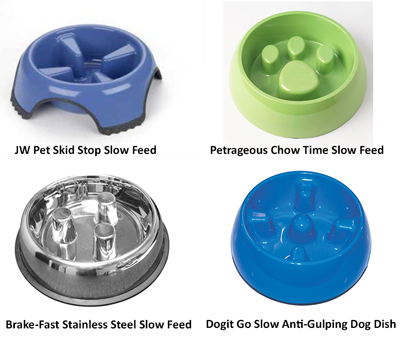 One way to help prevent bloat issues to is train your dog to eat more slowly. Several products can help with the process, such as slow-feed bowls or slow-feed adaptors. DogIt, JW Pet, Petrageous Designs and Brake-Fast are just a few of the brands that offer slow-feeders. If you prefer not to buy new feeding dishes, you can opt for a slow-feed adaptor, which is placed inside your dog’s bowl. The Gobble Stopper is a bone-shaped adaptor that a dog has to eat around, which slows him down. Another adaptor is Omega Paw’s Stainless Portion Pacer, a metal ball that is placed inside a bowl to limit the amount of food your dog can access at one time.
One way to help prevent bloat issues to is train your dog to eat more slowly. Several products can help with the process, such as slow-feed bowls or slow-feed adaptors. DogIt, JW Pet, Petrageous Designs and Brake-Fast are just a few of the brands that offer slow-feeders. If you prefer not to buy new feeding dishes, you can opt for a slow-feed adaptor, which is placed inside your dog’s bowl. The Gobble Stopper is a bone-shaped adaptor that a dog has to eat around, which slows him down. Another adaptor is Omega Paw’s Stainless Portion Pacer, a metal ball that is placed inside a bowl to limit the amount of food your dog can access at one time.
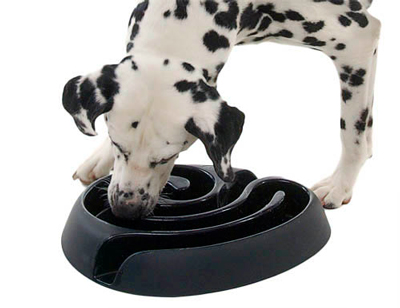
You could also put your dog’s meals in a food puzzle and make them work for it. Food puzzles come in different designs and sizes to suit your breed. Buster, Outward Hound and The Company of Animals offer food puzzles. I have tested a food puzzle and it can stop a dog from wolfing down a meal in three minutes and extend dining time to a “leisurely” 10 minutes, which can definitely help with the digestion.
If you feed your dog only once a day, consider increasing his mealtimes to two or more a day. Doing so could help lessen your dog’s tendency to gulp his food in just a few swallows by reducing his hunger level. Adding wet food to his kibble, and feeding a calcium-rich meat meal could also decrease the risk of bloat, VCA Hospitals website state.
No matter which methods you try, by slowing down your dog’s eating time, he might even get to use his taste buds and enjoy his meals even more.
About the Author: Sandy Robins is the 2013 winner of the “Excellence in Journalism and Outstanding Contribution to the Pet Industry Award.” Her work appears on many of the country’s leading pet platforms, such as MSNBC.com, MSN.com and TODAYShow.com. She is a regular contributor and columnist in multiple national and international publications, including Catster, as well as the author of the award-winning books “Fabulous Felines: Health and Beauty Secrets for the Pampered Cat” and “For The Love of Cats.” Learn more about Sandy on her website or Facebook page. #welovecats



